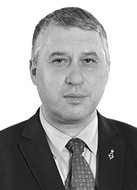Socio-psychological aspects of modern sport extremism
Фотографии:
ˑ:
Teoriya i praktika fizicheskoy kultury №1 2018, pp.13-15
PhD, Associate Professor P.E. Suslonov1
PhD, Associate Professor M.A. Beduleva1
Dr.Hab., Professor V.L. Nazarov1
Dr.Hab. A.V. Ponomarev1
1Ural Federal University (UrFU), Ekaterinburg
The study analyses the indications and specifics of the socio-psychological drivers of the modern sport extremism with a special emphasis on the social prerequisites for the growing social tension and, as a result, behavioural deviations and extremist actions in the supporter communities. The study demonstrates that it is the psychological type prone to the extremist behaviour and having a special mindset that strives to realize itself in the sport extremism; and gives evidence of the modern sport extremism being based on the relevant socio-psychological grounds of complex multisided structure. It is further demonstrated that the modern sport extremism is largely driven by the relevant socio-psychological settings dominated by elements of fanaticism and xenophobia. The study analyses the meanings of fanaticism and xenophobia in the context of the modern sport extremism; and formulates the dominating models of consciousness potentially indicative of the individual predispositions for fanaticism and xenophobia. The study comes to the conclusion that the modern sport extremism is largely due to the reasons and conditions facilitating the relevant socio-psychological settings to cultivate fanaticism and xenophobia that are largely formed in the consciousness of supporters with the relevant behavioural models driven by hatred and hostility to the opposing ‘enemy’ sport communities. A special emphasis is recommended to be made on the systemic efforts to prevent and mitigate the sport extremism with due consideration for its socio-psychological drivers and specifics.
Keywords: sport extremism, socio-psychological setting, fanaticism, xenophobia.
References
- Inshakov S.M. Kriminologiya. Uchebnik [Criminology. Textbook]. Moscow: Yurisprudentsiya publ., 2000, 432 p.
- Ilyasov F.N. Motivatsiya i aktivnost futbolnykh bolelschikov [Motivation and activity of football fans]. Sotsialnye issledovaniya, 2016, no. 3.
- Narkhov D.Y., Ilyinykh V.V. Proyavlenie sportivnogo ekstremizma v molodezhnoy srede: itogi sotsiologicheskogo issledovaniya (dekabr 2011 – fevral 2013 g. [Sports extremism in youth environment: sociological survey results (December 2011 - February 2013)]. Ekaterinburg: UU publ., 2013, 197 p.
- Reprintseva E.A. Pedagogika igry: teoriya, istoriya, praktika [Game pedagogics: theory, history, practice]. Kursk: KSU publ., 2005, 421 p.
- Pavlovskiy I.R. Sotsiologiya molodezhi i yuvenologiya [Youth sociology and juvenology]. Sotsiologicheskie issledovaniya, 1999, no. 5.
- Suslonov P.E. Teoretiko-metodologicheskie aspekty izucheniya sotsialnoy psikhologii politicheskogo ekstremizma i terrorizma [Theoretical and methodological aspects of studying social psychology of political extremism and terrorism]. Gumanitarnye, sotsialno-ekonomicheskie i obschestvennye nauki, Krasnodar: Nauka i obrazovanie, 2014, no. 8.
- Suslonov P.E. Rol i zadachi organov vnutrennikh del po organizatsii protivodeystviya prestupnosti ekstremistskoy napravlennosti v Rossiyskoy Federatsii [The role and tasks of anti-extremism programs of internal affairs bodies in the Russian Federation]. Ekaterinburg: Ural Law Institute of MIA Russia publ., 2015, 153 p.




 Журнал "THEORY AND PRACTICE
Журнал "THEORY AND PRACTICE